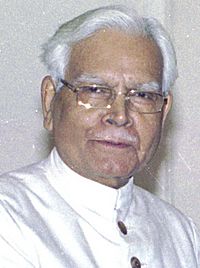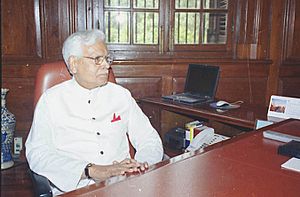Natwar Singh facts for kids
Quick facts for kids
K. Natwar Singh
|
|
|---|---|
 |
|
| Minister of External Affairs | |
| In office 22 May 2004 – 6 December 2005 |
|
| Prime Minister | Manmohan Singh |
| Preceded by | Yashwant Sinha |
| Succeeded by | Manmohan Singh |
| Minister without portfolio | |
| In office 8 December 2005 – 22 May 2009 |
|
| Prime Minister | Manmohan Singh |
| Preceded by | Mamata Banerjee |
| Succeeded by | Arun Jaitley |
| Personal details | |
| Born | 16 May 1929 Jaghina, Bharatpur, Bharatpur State, British Raj (present-day Rajasthan, India) |
| Died | 10 August 2024 (aged 95) |
| Political party | Indian National Congress (1984–2006) |
| Spouse | Heminder Kaur |
| Children | Jagat Singh Ritu Kaur |
| Residence | New Delhi |
| Alma mater | Mayo College, Ajmer St. Stephen's College, Delhi Scindia School |
| Occupation | Politician |
| Awards | Padma Bhushan |
| Signature |  |
Kunwar Natwar Singh (born May 16, 1929 – died August 10, 2024) was an important Indian diplomat and politician. He served as India's Minister of External Affairs from May 2004 to December 2005.
Singh joined the Indian Foreign Service in 1953. This service trains diplomats who represent India in other countries. In 1984, he left this service to join politics. He became a member of the Indian National Congress party. He won elections and served as a government minister until 1989. Later, he became India's foreign minister in 2004. However, he resigned about 18 months later. This happened after a United Nations report linked him to issues related to the "Oil-for-Food Programme" in Iraq.
Contents
Early Life and Education
Natwar Singh was born on May 16, 1929, in the princely state of Bharatpur. A princely state was a region in India ruled by a local king or prince before India became independent. His family was an aristocratic Jat Hindu family, meaning they were from a noble background. They were also related to the ruling family of Bharatpur.
He attended Mayo College in Ajmer and Scindia School in Gwalior. These schools were traditionally for children from royal and noble families in India. After that, he earned a degree from St. Stephen's College, Delhi. He also studied at Corpus Christi College, Cambridge University in the United Kingdom. For some time, he was a visiting scholar at Peking University in China.
Diplomatic Career
Natwar Singh joined the Indian Foreign Service (IFS) in 1953. He worked as a diplomat for 31 years. Diplomats represent their country's interests abroad. One of his first jobs was in Beijing, China, from 1956 to 1958.
He then worked at the Permanent Mission of India in New York City from 1961 to 1966. During this time, he also represented India on the executive board of UNICEF (United Nations Children's Fund). He was part of several United Nations committees. In 1966, he started working in the Prime Minister's office under Indira Gandhi.
Singh served as India's Ambassador to Poland from 1971 to 1973. He was also India's Deputy High Commissioner to the United Kingdom from 1973 to 1977. Later, he became India's Ambassador to Pakistan from 1980 to 1982.
He was part of Indian groups that attended important international meetings. These included the Heads of Commonwealth Meeting in Kingston, Jamaica, in 1975. He also attended the United Nations General Assembly sessions in New York. In 1982, he traveled with Prime Minister Indira Gandhi on her visit to the United States.
Natwar Singh was an Executive Trustee for the United Nations Institute for Training and Research (UNITAR) for six years. He was also appointed Secretary-General for the Seventh Non-aligned Summit in New Delhi in 1983. In the same year, he was the Chief Coordinator for the Commonwealth Heads of Government Meeting (CHOGM) in New Delhi. He worked as a Secretary in the Ministry of External Affairs from 1982 to 1984. In 1984, he received the Padma Bhushan. This is one of the highest civilian awards given by the Government of India.
Political Career
In 1984, Natwar Singh resigned from the Indian Foreign Service. He joined the Indian National Congress party. He was elected to the 8th Lok Sabha (India's lower house of Parliament) from the Bharatpur area in Rajasthan.
In 1985, he became a Minister of State. A Minister of State is a government minister, but one level below a cabinet minister. He was in charge of areas like steel, coal, mines, and agriculture. In 1986, he became the Minister of State for External Affairs. In this role, he was chosen to be the President of the UN Conference on Disarmament and Development in New York in 1987. He also led the Indian group to the 42nd Session of the UN General Assembly.
Singh remained a Minister of State for External Affairs until 1989. The Congress party lost power in the general elections that year. He also lost his election from the Mathura area.
The Congress party returned to power in 1991. P.V. Narasimha Rao became Prime Minister. At this time, Natwar Singh was not a Member of Parliament (MP), so he could not be a minister. He later left the Congress party with some other leaders and formed a new party.
In 1998, he rejoined the Congress party. He was elected to the 12th Lok Sabha (1998–1999) from Bharatpur again. He had to sit in the opposition, meaning his party was not in power. He lost the elections in 1999. After a few years, he was elected to the Rajya Sabha (India's upper house of Parliament) from Rajasthan in 2002.
The Congress party won the elections in 2004. Prime Minister Manmohan Singh then appointed Natwar Singh as the Minister for External Affairs.
Personal Life
In August 1967, Natwar Singh married Maharajkumari Heminder Kaur. She was the eldest daughter of the last Maharaja of Patiala State, Yadavindra Singh of Patiala. Her brother is Captain Amarinder Singh, who was also a chief minister of Punjab. Heminder's mother, Mohinder Kaur, was also involved in public life.
Autobiography
In August 2014, Natwar Singh's autobiography was released. It was titled One Life is Not Enough. The book shares details about his political career. It gives an inside look into the world of politics in Delhi. The book also describes his relationship with Indian National Congress president Sonia Gandhi. In his book, Natwar Singh also shared his side of the story regarding the UN report and his resignation.
See also
 In Spanish: Kunwar Natwar Singh para niños
In Spanish: Kunwar Natwar Singh para niños
- Dr. S. Jaishankar
- Navtej Sarna
- Syed Akbaruddin
- Taranjit Singh Sandhu
- Harsh Vardhan Shringla


